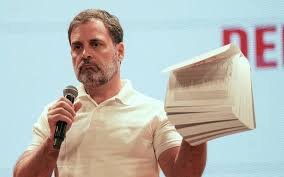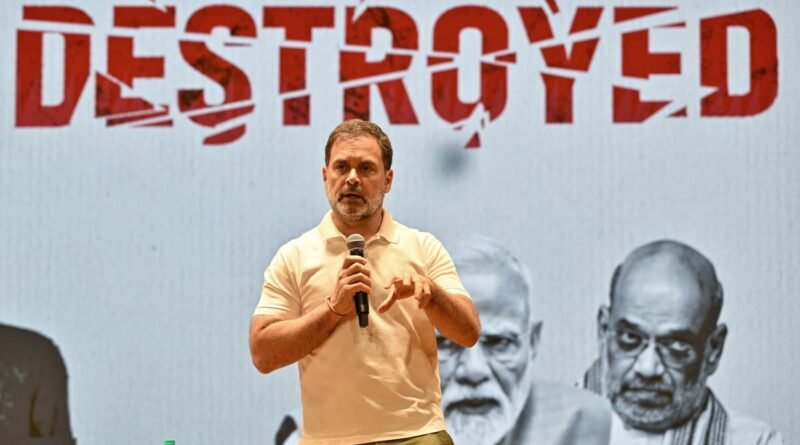Analyzing the Allegations: The Debate Over Electoral Integrity
Analyzing the Allegations: The Debate Over Electoral Integrity : In a recent press conference, Congress leader Rahul Gandhi made a series of allegations regarding widespread electoral irregularities in the 2024 general election. His claims, which he stated were based on a six-month investigation by his party, have sparked a national debate about the integrity of the democratic process. This article provides a breakdown of his claims and the official response from the Election Commission of India (ECI)

Key Points of the Allegations
Rahul Gandhi’s presentation highlighted several categories of alleged electoral fraud. whats that? Details below.
Duplicate Voters: Claims were made that the voter list contained instances of the same person registered multiple times.
Invalid Addresses: The presentation pointed to voters allegedly registered at addresses that were found to be incomplete or non-existent.
Bulk Registrations: Examples were shown of an unusually high number of voters listed at a single residential address.
Questionable Voter Details: Concerns were raised about voters with incomplete or invalid photographic details.
Misuse of Form 6: He alleged that this form, used for new voter registrations, was improperly used to add a significant number of voters to the rolls, including individuals whose ages did not align with a new voter profile.
Case Study: Mahadevapura, Bangalore
As a central example, Mr. Gandhi focused on the Mahadevapura assembly segment in the Bangalore Central Lok Sabha constituency. He presented specific figures, claiming to have identified over 100,000 “fake votes” in this segment, which he stated contributed to the final election result. The Congress party’s data, according to him, was collected through a meticulous process of comparing paper voter lists with physical ground verification. He also accused the ECI of providing non-machine-readable PDFs to hinder such an analysis. apart of this On Youtube we found many channels showing proofs of fake voters from different places.
The Election Commission’s Response
The Election Commission of India has strongly rebutted these allegations. The ECI has publicly called the claims “absurd” and challenged Mr. Gandhi to submit a signed declaration under oath, as is legally required to formally back up such claims. The Commission has stated that a failure to do so would imply the allegations are unsubstantiated. The ECI has also pointed out that the Karnataka government, which is run by the Congress, is using the same electoral rolls for a caste census, a fact that it claims contradicts the party’s allegations of fraud.
Public Opinion and The Path Forward
The allegations of electoral fraud have deeply divided public opinion. One perspective is that Mr. Gandhi’s data-driven presentation serves as compelling evidence that demands a thorough investigation. Those who hold this view may see it as their civic duty to voice concerns about the democratic process.
Conversely, another perspective is that the claims are politically motivated, intended to discredit the ECI and the government following an electoral defeat. This group might argue that the public should trust the official processes and await the outcome of the ECI’s actions rather than reacting to unverified claims.
The next few months will be crucial in determining how these events unfold. The public response will depend on the ECI’s next steps and how effectively the opposition can maintain a unified front on the issue.
What’s your opinion? comment below!

